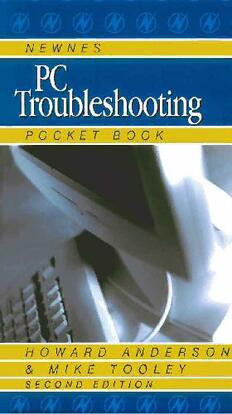
Newnes PC Troubleshooting Pocket Book PDF
Preview Newnes PC Troubleshooting Pocket Book
Newnes PC Troubleshooting Pocket Book Newnes PC Troubleshooting Pocket Book Second edition Howard Anderson and Mike Tooley @ Newnes AMSTERDAM BOSTON HEIDELBERG LONDON NEW YORK OXFORD PARIS SAN DIEGO SAN FRANCISCO SINGAPORE SYDNEY TOKYO Newnes An imprint of Elsevier Linacre House. Jordan Hill, Oxford OX2 8DP 200 Wheeler Road, Burlington. MA 01803 First published 1998 Second edition 2003 Copyright 0 1998.2003. Howard Anderson and Mike Tooley. All rights reserved The right of Howard Anderson and Mike Tooley to be identified as the authors of this work has been asserted in accordilna with the Copyright. Designs and Patents Act 1988 No part of this publication may be reproduced in any material form (including photocopying or storing in any medium by electronic means and whether or not transicntly or incidentally to some other use of this publication) without the written permission of the copyright holder except in accordana with the provisions of the Copyright. Designs and Patents Act 1988 or under the terms of a licence issued by the Copyright Licensing Agency Ltd. 90 Tottenham Court Road. London, England WIT 4LP. Applications for the copyright holder's written permission to reproduce any part of this publication should be addressed to the publisher. Permissions may be sought directly from Elsevier's Science and Technology Rights Department in Oxford. UK phone: (tu)(0) 1865 R43830 pdx: (+4(0)) 18 65 853333: e-mail: permissions(~ielsevier.co.uk.Y ou may also complete your request on-line via the Elsevier Science homcpdge (http://www.elsevier.com). by selecting 'Customer Support' and then 'Obtaining Permissions'. British Library Cataloguing in Publication Data A catalogue record for this book is available from the British Library ISBN 0 7506 59882 For information on all Newnes publications Typeset by Keyword Typesetting Services Printed and bound in Great Britain by Biddles Law .biddles.co.uk Contents Preface ix 1 Introduction 1 1 .I A brief history of the PC 1 1.2 Conventions used in this book 3 1.3 General approach to troubleshooting 3 1.4 Where to start 4 1.5 What to ask 4 1.6 Categorizing faults 5 1.7 Hardware faults 7 I .8 Software faults 8 1.9 Configuration problems 9 1.10 Burn-in 9 1.1 1 What is fitted in your PC? 9 1.12 General points 9 2 The Internet 11 2.1 Internet, the main search engines 12 2.2 Searching the web 13 2.3 An example of searching the Internet 16 2.4 Can you trust the answers you find? 17 3 Microcomputer fundamentals 18 3.1 Microcomputer basics 18 3.2 Catching the bus 19 3.3 Expanding the system 19 3.4 Clocks and timing 22 3.5 Interrupting the system 22 3.6 Data representation 23 3.7 Binary and hexadecimal 24 3.8 A quick tour of the system 24 3.9 Operating systems 28 3.10 Dismantling a system 30 3.1 1 Safety first! 31 3.12 Static hazards 32 3.13 Cooling 33 4 System architecture and construction 35 4.1 PC architecture 35 V vi Contents 4.2 Modern system board layouts 35 4.3 Wiring and cabling 37 38 4.4 Replacing the CPU 4.5 Upgrading the CPU 39 4.6 Troubleshooting the motherboard 39 45 5 The PC expansion buses 5.1 ISA bus 45 5.2 EISA bus 46 5.3 MCAbus 46 5.4 VESA (or VL) bus 46 5.5 PCI bus 46 5.6 Troubleshooting the PCI bus 48 5.7 Accelerated graphics port (AGP) 49 5.8 Troubleshooting the AGP 49 6 Semiconductorm emory 51 6.1 Memory basics 51 6.2 Upgrading your BIOS ROM 52 6.3 Random access memory (RAM) 53 6.4 RAM troubleshooting 55 6.5 CMOS RAM 57 6.6 Memory diagnostics 57 7 Printers and the printer interface 59 7. I Parallel I/O 59 7.2 ECP/EPP (Centronics) printer port 59 7.3 Printer types and emulations 60 7.4 Troubleshooting the printer 62 7.5 Printing from Windows 62 7.6 General printer troubleshooting 63 8 The serial communication ports 65 8.1 The RS-232 standard 65 8.2 Troubleshooting the serial ports 67 9 Replaceable disk drives 74 9.1 Floppy disk formats 74 9.2 The boot record 75 9.3 Booting the system 75 9.4 Troubleshooting the floppy disk drive 76 9.5 Replacing a disk drive 77 9.6 Zip and Jaz disk drives 78 9.7 Troubleshooting Zip disks 78 Contents vii 10 Hard disk drives 80 10.1 Hard drive basics 80 10.2 Disk performance 82 10.3 Drive interfaces 84 10.4 Comparative performance of SCSI and IDEiATA 88 10.5 Partitioning the disk 89 10.6 The master boot record YO 10.7 Troubleshooting the hard drive 91 10.8 Installing, replacing or upgrading a hard disk drive 94 10.9 Recovering from disaster 99 II Displays 102 I1 . I PC display standards 102 1 1.2 Video graphics 103 11.3 Graphics cards 104 11.4 Video RAM required 106 11.5 Display types 109 I1 .6 Troubleshooting displays 114 11.7 Troubleshooting video adapters 1 I5 12 Viruses 1 I6 12. I Types of virus 116 12.2 Email viruses I I8 12.3 Hoaxes II 8 12.4 Sources of viruses 119 12.5 Virus prevention 120 12.6 Detecting and eliminating viruses 121 12.7 Anti-virus software - seven of the best 123 12.8 Getting virus help via the Internet 124 13 Troubleshooting Windows error messages 126 13.1 Invalid page faults 128 13.2 General protection faults 129 13.3 Fatal exceptions 137 13.4 Protection errors 140 13.5 Kernel errors 143 13.6 Dynamic link library faults 144 13.7 Using Dr Watson 145 14 Troubleshooting Windows registry 155 14.1 Windows 95.98 and ME 155 14.2 Windows 2000 157 14.3 Windows XP 157 14.4 More links to registry related sites 158
